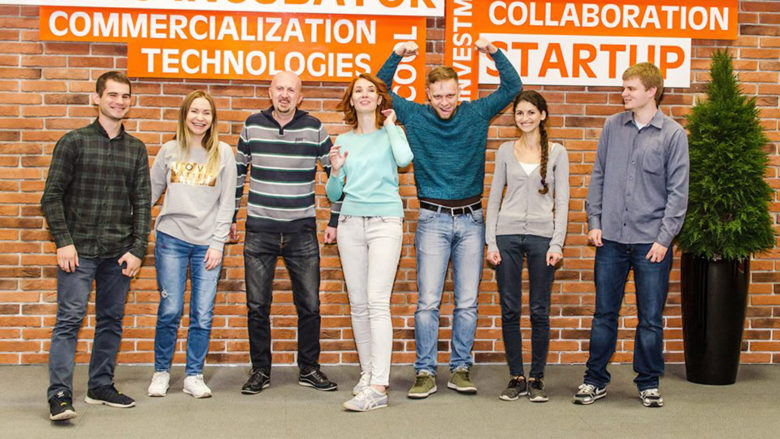Roadtrip CEE: How to make Belarus the home of Bitcoins

“All HiTech Park companies enjoy a large tax bonus. They do not have to pay VAT and (almost) no income taxes and have a lower rate for wage taxes. This makes it possible to hire the best developers, managers and other employees. The dividend tax for non-resident founders or corporations is only 5 per cent.” – Aliaksandr Aheichyk, CEO of iDiscount.
Legally speaking, it was a thunderbolt. Even politically. On 28 March 2018, the decree No. 8, called „On the Development of a Digital Economy“, came into force in Belarus. It was personally enacted by the President of the Republic, Alexander Lukashenko. The decree creates a form of special right for digital enterprises in Belarus.
„The decree gives companies of the HiTech Park Belarus in Minsk great tax and entrepreneurial advantages. The entire IT community in Belarus benefits from this regulation,“ raves Aliaksandr Aheichyk. He is CEO of the digital start-up iDiscount, which develops apps for customer loyalty programs or, as he describes it, offers „customer cards without plastic and without paper“. He thinks he is in the right place at the right time: A dynamic techie community has formed in Minsk in recent years. The HiTech Park (HTP) plays a special role.
Megalopolis of outsourcing
iDiscount.by is one of 192 companies currently located in the IT cluster of HTP. More than half of these are foreign companies or participations. The HTP consists of a huge office area at the gates of the Belarusian capital, but also has virtual residents. „You can be a HTP resident today and work from anywhere in Belarus. From the largest city to the smallest village,“ explains Aheichyk. But only those who have the privilege of HTP membership can invoke Decree No. 8.
The management consultancy Ernst & Young (EY) estimates that the HTP cluster around Minsk today comprises 30,000 software engineers. The HTP Residency is open to domestic and foreign IT companies whose business plan has convinced the HTP administration. The final decision is made by the ministry-like HTP Supervisory Board. EY believes that a decision can be expected within one month of application.
It works
The output is considerable: five of the ten largest companies in the Forbes ranking are residents of HTP. These companies provide software and IT services to 67 countries worldwide. Around 91 percent of HTP sales volumes come from the export of services. The high foreign share results from the numerous privileges granted to HTP residents. These include tax benefits, government support, low costs for full-time IT professionals, free recruitment of foreign professionals and a simplified registration process. Minsk is now the megalopolis of European IT outsourcing.
Capital of Bitcoin
At present, fintechs are the fastest growing village in the entire Belarusian digital community. Due to Decree No. 8, Minsk becomes the capital of crypto currencies. The decree grants HTP residents even more special rights or extends them. In addition to the tax advantages, the decree simplifies start-ups with foreign participations and – which is very unusual given the FX shortage in Belarus – it promises free currency access to dollars and euros.
Since 2006, almost all IT-related companies in Belarus have been gathering under this umbrella of digital independence. According to statistics from Belarusfeed, the number of HTP companies increased by 25 percent after the signing of Decree No. 8. In just a few months, 88 companies were granted the status of residents. Many of them are fintechs specializing in business around Bitcoin and Co.
Legal basis for crypto currencies
Decree No. 8 contains provisions in the field of digitization that are unique in the world. This is the opinion of the German Konrad Adenauer Foundation, which has looked at the Belarusian digitization offensive. The reason for the generous verdict of the German think tank: The decree legalizes companies based on blockchain technology as well as all activities in connection with crypto currencies and digital tokens. Digital contracts are thus becoming valid in Belarus. The regulation for the practical use of the registers of transaction blocks or blockchain is also completely new.
In addition, the decree gives natural and legal persons who are not registered in the HTP a de facto (tax) free hand for the use of the blockchain in the circulation of cryptographic currencies until 1 January, 2023: „Persons have the right to possess tokens and, taking into account the special features laid down in this decree…. to carry out the activities“. Mining, the storage of tokens in virtual wallets, the exchange of tokens and their purchase and sale for Belarusian roubles or against foreign currency are explicitly permitted. For the first time, this will provide Blockchain businesses in Belarus with a sound legal framework and local companies, like for example CopPay, the opportunity to further scale their business. CopPay offers blockchain payment solutions for retailers and allows merchants to accept and exchange cryptocurrencies.
Fresh foreign investment
The Belarusian government hopes that the extremely liberal HTP special rights will generate an inflow of future investments into the country – not only in the form of capital, but also in the form of competence. The decree encourages the influx of top foreign workers into the country. It allows foreign specialists to be recruited by HTP residents without special work permits. In addition, visa-free entry for skilled workers and company founders is granted for 180 days a year. If the plans of the Lukashenko government work, the number of employees in the high-tech sector is to increase from currently 30,000 to over 100,000 by 2030 – and the problem of labor migration could be reversed.
Banks, such as Raiffeisen’s Priorbank, are also playing an important role in the development and internationalization of the Belarusian fintech ecosystem. Priorbank is frequently organizing hackathons and offers local fintech start-ups the opportunity to cooperate. Recently, the credit scoring platform GiniMachine, that is based on advanced machine learning algorithms, participated in Priorbank’s ‘Elevator Lab Challenge’ and is now send to the Elevator Lab finals in Vienna to compete with international fintechs.
The Exodus of the Successful
However, the reality in Belarus is not yet entirely painted in pink. Belarusian IT companies – among them many Fintechs – show the tendency to relocate their headquarters to the USA or Great Britain if they are successful. Most recently, Botscape left the field. The start-up, which specialized in Facebook marketing with bots, moved to New York in December and received 130,000 dollars in start-up capital from an
Customer loyalty made easy
For iDiscount founder Aliaksandr Aheichyk, emigration is currently not an option. „I’ve been abroad so much that I’ve had enough. And things are going well for us at the moment,“ he is satisfied with the development of his company. He employs seven people and is looking for more. Especially in small and medium-sized companies in Western Europe the interest in digital marketing via customer app is growing. He likes to admit that digital customer cards are nothing completely new. But: „Our app can be integrated into any CRM system with one click.“ And no one else can do it in this simplicity. He’s sure about that.
This article was written in cooperation with the Fintech Accelerator Program „Elevator Lab“ of Raiffeisen Bank International. In 2018, the program has also rolled out local challenges in eight CEE markets (Albania, Belarus, Bulgaria, Kosovo, Romania, Russia, Slovakia and Serbia). Data material was provided by Raiffeisen RESEARCH.





























